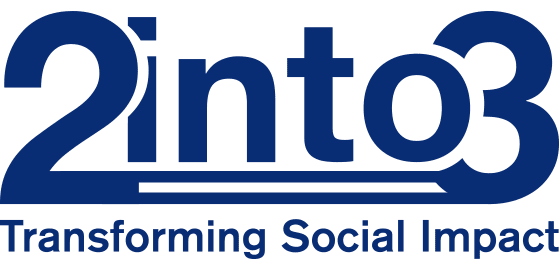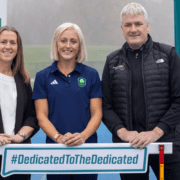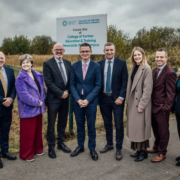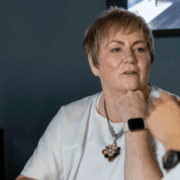Authored by Matt McKerrow, Associate Consultant
As a father of toddler boy/girl twins, I am ever vigilant (and regularly reminded by my constituents) to ensure I am equitable in all dealings, particularly those that pertain to distribution of important resources – like strawberries, or marshmallows.
And OK, whilst two for the price of two does require significant extra resources (time, energy, and effort) – one of the great benefits of parenting dual small humans, beyond the constant gender equity check, is the diversity of experiences, learning, and as a result extra knowledge, that comes and will continue to come from raising a girl and boy the same age at the same time. That’s without considering what they’ll learn and gain from each other in the process. Summary: More work, tricky to balance, but increased knowledge, richer experiences, better and fairer outcomes for all, right? That’s my theory anyway.
Therefore, I can’t help but notice some parallels as the Irish sport governing body sector prepares for the pending 40% board gender balance deadline at year end. Recent media reports indicate the Football Association of Ireland (FAI) [1] [2] and the GAA [3] are among the organisations working earnestly towards change facing into the challenge of meeting the deadline – and I am sure there are others.
Here are some key points to consider for making progress towards balancing your board:
S/he got more than me
Whilst those electing sports boards may not prioritise or appreciate the benefit of the additional experience, knowledge and perspective that having a diverse board brings, it does seem implausible they could rationalise leaving 50% of the funding available to their sport on the table. Especially when this would then potentially be available to be re-distributed to other NGBs, their fellow ‘sport system siblings’. Neither of my 3-year-olds would stand for that.
International perspective
Having spent near equal amounts of time during my 20+ year career working in sports governance in Ireland, as in New Zealand & Australia, I am well placed to compare and contrast the Irish context with others I’ve worked in. I’ve also seen/heard some absolute clangers (refer to this article’s title quote, uttered much more recently than you’d imagine) and gathered some fascinating insights from both hemispheres as national sports systems have evolved to tackle the challenges of board gender balance and board independence.
Governance Principles over time
In a federated country, Australian NGBs (National Sporting Organisations or NSOs as they’re known down under) have long grappled with multiple layers of governance existing together – especially when it comes to the issue of independence.
A first version of the Australian Sports Commission (ASC) Governance Principles were published in 2002 and they have undergone several iterations since, most recently in 2023 [4]. The most recent version is explicit regarding board gender balance at 4.3: “The board (…) should be composed in a manner such that no one sex accounts for more than 60% of the total number of Directors”; and regarding independence at 4.4: “The organisation’s directors should be independent, regardless of whether elected or appointed”.
It is of note that whilst the ASC “Governance Code” has existed for decades, with prescription regarding board composition, a Women on Boards report [5] published in 2020 indicated that up to approximately 30% of funded Australian NSOs did not meet the 40% target that is currently prescribed in the ASC principles at that time. The more recently published ASC Governance Standards Benchmarking Report 2023 [6] depicts a decrease in the gender balance standard (4.4) since 2021, and highlights Diversity, Equity & Inclusion (4.2) as one of the “bottom 5” poorer performing standards where Board Independence (4.4) is among the Top 5.
Which country has it right?
By contrast, New Zealand, which is often compared to Ireland, in land and population size, sadly in terms of 2023 RWC performance, and notably examined in sporting system context detail at the 2018 Federation of Irish Sport Annual Conference – could be said to lead the way in board gender diversity. Sport New Zealand reported near 100% compliance (65 out of 66 funded organisations) with its 40% gender target in 2021, three years after publication of its 2018 Women & Girls Strategy and accompanying policy to impose significant penalties for those organisations not in compliance. Sport NZ report an overall improvement in governance and board dynamics as a result. [7]
Fiercely independent?
Speaking of New Zealand, and at the risk of again mentioning rugby, it is relevant to reference the recently published NZ Rugby (NZRU) Governance Review [8]. A highlighted summary contended the governance of the NZRU, the organisation behind the All Blacks and Black Ferns, is not currently fit for purpose, and offered some strong recommendations.
In contrast to the current issues reported in Ireland within the FAI – as they attempt to re-structure their board to meet their MOU obligations to government to have a 50/50 split of “football” and “non-football” directors [9] – the recommendation of the NZRU review is that the NZRU board be completely independent of constituent directors, instead proposing the inception of a Council structure where representatives of rugby’s stakeholder groups would feed into the governance of the organisation on select and specific terms. In that review, an independent director is defined to be one who is “four years (out of the game or) out of positions of influence within the game”. This may be viewed by some as heavy handed.
Rising through the ranks
For sports organisations with federal structures of governance – eg club> county>province>national, as in Ireland, there is an established practice of Presidents/Chairs/board members progressing “up the ranks”. This is often lauded as an achievement and viewed as an acknowledgement or even an entitlement based on time served within the sport. It would be common that upon election to a higher tier the director would resign from their lower tier appointment, but often one occurs directly following the other, with minimal, if any, time away from influential roles in the sport – and certainly not a four-year stand-down.
Nearly there
In late 2022, Sport Ireland indicated that if the current trajectory to that time were to continue, the target of 40% gender balance on NGB boards would be achieved in 2023 [10]. This can only be viewed as a positive development for Irish sport in terms of the greater knowledge, insight and diversity in board decision making, and overall improvement in governance of the sector.
More to come?
One wonders – if Irish sport is emulating, and close behind, our NZ counterparts in achieving board gender balance targets; our government, via their MOU with the FAI, are already seeking to ensure greater independence on sports boards; and the organisation behind arguably one of the world’s greatest sports teams appears set to be governed by a rigorously independent board – could we, and should we, expect to see the Sports Minister and Sport Ireland setting quotas and targets for board independence similar to those for gender balance in the not too distant future?
Insights
Insight 1
Like ‘em or loathe ‘em – quotas are here to stay
- Target quotas are a mechanism that serve the purpose of rallying a sector and allow measurement of progress towards a broader societal aim. Their detractors might say they are crude and tokenistic or may use phrases such as “box-ticking” and “window dressing”. Based on my experience of sports governance across international contexts, they are, and continue to be a necessary tactic to ensure the advantages of board diversity and independence are promoted and achieved for the wider benefit of an organisation’s stakeholders and society at large. With a continuing societal movement towards ESG targets in Ireland and abroad, we are likely to see that measures and quotas will continue across all walks of life, not just sport. Moreover, perhaps board independence is next?
Insight 2
Targeted strategy, investment and quotas are supercharged when leveraged with penalties
- With New Zealand as case in point, sports systems that have moved to significantly penalise non-compliance have experienced greater success than those where principles exist without meaningful consequence. It is encouraging to see the firm line taken by the Sports Minister and Sport Ireland threatening a 50% reduction in the allocation from 2024 for all non-compliant organisations, especially in relation to capital grants as well as program funding. The sports sector will wait with interest to see the ramifications for any organisations not achieving the target in the New Year.
Insight 3
S/he who pays the piper…
- Many sporting organisations have bemoaned the loss of sovereignty that comes from a government funder dictating terms and imposing what might be seen to be heavy handed conditions upon them. “Who are they to tell us how to run our sport?” Whilst you’d expect a sport’s community are best placed to deliver that sport – it is however worth remembering that if s/he who pays the piper calls the tune, a sport seeking investment from government, sponsors, philanthropists and even from their own members and clubs – must take heed of their wishes in putting together their playlist. Furthermore, it’s not unreasonable to expect that diversity, independence and other ESG factors will feature in their requests.
Insight 4
It’s no walk in the park, but the effort is worth it.
- A Richie McCaw quote highlighted in the NZRU Governance Review says: “If you want to be the best in the world, it is going to be hard. If you are not prepared to do that, you are in the wrong room”. Progressing the governance of your organisation so your sport can attract heightened funding and achieve great things in terms of increasing participation, connecting communities, raising profile, and delivering awe inspiring winning performances isn’t easy. But it’s a choice. The process is not glamorous, it takes time, significant effort, considerable energy and you can certainly expect detractors, hurdles, miss-steps, learning experiences, unpopularity, argument, compromise and debate along the way. But that pales in comparison with the benefits as greater knowledge, richer experiences and ultimately the achievement of inspirational outcomes are realised. The final destination is worth enduring the tantrums – just like twin parenting.
Get in Touch
This article is authored by: Matt McKerrow, Associate Consultant, specialising in governance and strategy assignments for NGBs, clubs and other sports organisations within 2into3’s sports sector.
If your sports organisation is interested in gaining support in governance or strategy, contact our Associate Consultant, Matt McKerrow or our Director of Advisory Services, Sheena Horgan at sheena.horgan@2into3.com. For more on our work with sports organisations, visit our page here.
References
[1] Headache for FAI as crucial motion fails to pass
[2] Funding to FAI from Sport Ireland delayed (rte.ie)
[3] Relief as GAA votes for better gender balance on management committee
[4] Australian Sports Commission Governance Standards SGS-final.pdf (sportaus.gov.au)
[5] Women on Boards NSO Board Gender Report (womenonboards.net)
[6] Sport Governance Standards Benchmarking Report (sportaus.gov.au)
[7] Gender-equity-in-governance-sport-nz-3-11-22.pdf (sportnz.org.nz)
[8] NZRGovernance-Review-31-August-2023_web.pdf (nzrugby.co.nz)
[9] Sports minister warns FAI of ‘serious consequences’ if they fail to meet gender balance requirement (msn.com)
[10] Women in Sport Leadership Snapshot | Sport Ireland














